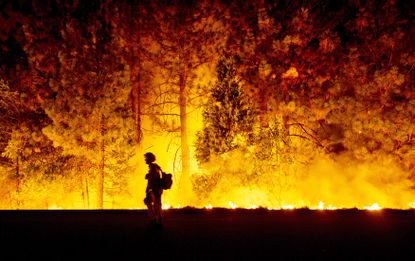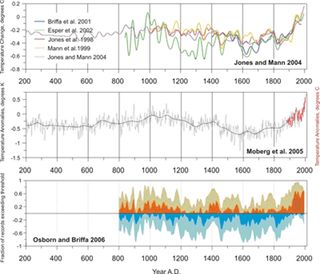The lesson of the hottest year on record: Climate change skeptics will never believe the science
The reasons to disbelieve the evidence are endless


According to the Japanese Meteorological Agency, the National Oceanic and Atmospheric Administration, and NASA, 2014 had the hottest atmospheric temperatures ever recorded, slightly beating 2010, 2005, and 1998.
For the last few years, arguments about a “pause” in the pace of warming have been in wide circulation among so-called climate skeptics, people who doubt the science of climate change to one degree or another. (See here, here, and here.) Since last year was the hottest one ever recorded, and particularly given that it wasn’t even an El Nino year (as record-breakers usually are), then one might imagine this would be time for some soul-searching among the skeptics.
Not remotely. If anything, the doubters are unusually worked up in their denunciations of climate hawks, climate scientists, and sympathetic media. It provides an interesting window into the reasoning process of such people. The pause has been memory hole’d for the moment, replaced with new arguments.
Subscribe to The Week
Escape your echo chamber. Get the facts behind the news, plus analysis from multiple perspectives.

Sign up for The Week's Free Newsletters
From our morning news briefing to a weekly Good News Newsletter, get the best of The Week delivered directly to your inbox.
From our morning news briefing to a weekly Good News Newsletter, get the best of The Week delivered directly to your inbox.
At The Federalist, Robert Tracinsky complains that the media is exaggerating the longevity of the record broken. We’ve only had detailed temperature records since 1880, so headlines that say hottest year in “recorded history” are misleading insofar as they conjure up images of ancient Sumer. That’s true so far as it goes, but Tracinsky is straight-up wrong when he asserts that temperatures before the age of thermometers, during, say, the Roman Empire and the Middle Ages, were warmer than they are today. This is false; as several different paleoclimate reconstructions have long shown, our current temperature is substantially above the best guess for those historical periods.

Now, if you look further back at ice core data, the Eemian interglacial period (roughly 130,000 to 115,000 years ago) was probably warmer than present day, though we’re on track to blow past it by the end of the century.
What are we to conclude from that? This line of reasoning is clearly meant to conclude that since previous periods were warm, current periods of warmth are no big deal. But that does not deal with the unprecedented speed at which we are driving temperature increases, nor the fact that the carbon dioxide concentration (which drives warming) has not been this high for at least 800,000 years.
The Daily Mail is even more dishonest than Tracinsky, bellowing that NASA scientists are pulling one over on the public because they allegedly are only “38 percent certain” that 2014 was the actual hottest year. This is taken from a NOAA/NASA presentation, one part of which calculates the odds of the very hottest years being wrong on account of random measurement noise. It concludes that under NASA’s methodology, there is a 38 percent chance 2014 is the hottest, a 23 percent chance it’s actually 2010, and so on. (The NOAA methodology gives different odds.)
That sounds complicated, but it’s not really. The bottom line here is that the scientists are only referring to the hottest four or five years, while the Mail is clearly implying that the 38 percent figure applies to all years. It’s misleading because the chances of one of those years (most in the last decade, remember) being the hottest one are much greater: 90 percent, by NOAA’s method.
At any rate, this kind of duplicitous legalistic quibbling is about par for the course for the science doubters. If it’s not the solar cycle, or sunspots, or a massive science-wide conspiracy, or the far over-hyped “pause,” it’s something else. No empirical result is going to change anyone’s mind here.
Sign up for Today's Best Articles in your inbox
A free daily email with the biggest news stories of the day – and the best features from TheWeek.com
Ryan Cooper is a national correspondent at TheWeek.com. His work has appeared in the Washington Monthly, The New Republic, and the Washington Post.
-
 Shahnaz Habib's 6 favorite books that explore different cultures
Shahnaz Habib's 6 favorite books that explore different culturesFeature The essayist and translator recommends works by Vivek Shanbhag, Adania Shibli, and more
By The Week US Published
-
 'Why is the expansion of individual autonomy necessarily always good?'
'Why is the expansion of individual autonomy necessarily always good?'Instant Opinion Opinion, comment and editorials of the day
By Justin Klawans, The Week US Published
-
 Will the murder of a health insurance CEO cause an industry reckoning?
Will the murder of a health insurance CEO cause an industry reckoning?Today's Big Question UnitedHealthcare CEO Brian Thompson was shot and killed in what police believe was a targeted attack
By Justin Klawans, The Week US Published